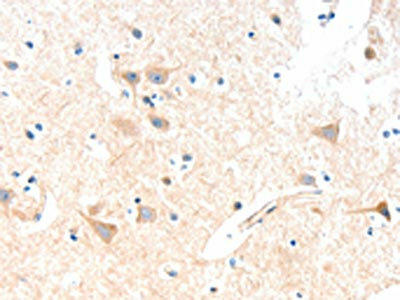Description
| Antibody Name: | SLC19A2 Antibody (PACO14998) |
| Antibody SKU: | PACO14998 |
| Size: | 50ul |
| Host Species: | Rabbit |
| Tested Applications: | ELISA, IHC |
| Recommended Dilutions: | ELISA:1:1000-1:2000, IHC:1:15-1:50 |
| Species Reactivity: | Human |
| Immunogen: | Fusion protein of human SLC19A2 |
| Form: | Liquid |
| Storage Buffer: | -20°C, pH7.4 PBS, 0.05% NaN3, 40% Glycerol |
| Purification Method: | Antigen affinity purification |
| Clonality: | Polyclonal |
| Isotype: | IgG |
| Conjugate: | Non-conjugated |
 | The image on the left is immunohistochemistry of paraffin-embedded Human brain tissue using PACO14998(SLC19A2 Antibody) at dilution 1/15, on the right is treated with fusion protein. (Original magnification: x200). |
| Background: | This gene encodes the thiamin transporter protein. Mutations in this gene cause thiamin-responsive megaloblastic anemia syndrome (TRMA), which is an autosomal recessive disorder characterized by diabetes mellitus, megaloblastic anemia and sensorineural deafness. |
| Synonyms: | solute carrier family 19 (thiamine transporter), member 2 |
| UniProt Protein Function: | SLC19A2: High-affinity transporter for the intake of thiamine. Defects in SLC19A2 are the cause of thiamine-responsive megaloblastic anemia syndrome (TRMA); also known as Rogers syndrome. TRMA is an autosomal recessive disease with features that include megaloblastic anemia, mild thrombocytopenia and leucopenia, sensorineural deafness and diabetes mellitus. Belongs to the reduced folate carrier (RFC) transporter (TC 2.A.48) family. 2 isoforms of the human protein are produced by alternative splicing.Protein type: Transporter, SLC family; Transporter; Membrane protein, integral; Membrane protein, multi-passChromosomal Location of Human Ortholog: 1q23.3Cellular Component: integral to membrane; plasma membraneMolecular Function: folic acid transporter activity; protein binding; thiamin transmembrane transporter activity; thiamin uptake transmembrane transporter activityBiological Process: vitamin metabolic process; thiamin and derivative metabolic process; thiamin transport; water-soluble vitamin metabolic process; folic acid transportDisease: Thiamine-responsive Megaloblastic Anemia Syndrome |
| UniProt Protein Details: | |
| NCBI Summary: | This gene encodes the thiamin transporter protein. Mutations in this gene cause thiamin-responsive megaloblastic anemia syndrome (TRMA), which is an autosomal recessive disorder characterized by diabetes mellitus, megaloblastic anemia and sensorineural deafness. [provided by RefSeq, Jul 2008] |
| UniProt Code: | O60779 |
| NCBI GenInfo Identifier: | 17391215 |
| NCBI Gene ID: | 10560 |
| NCBI Accession: | AAH18514.1 |
| UniProt Secondary Accession: | O60779,Q8WV87, Q9UBL7, Q9UKJ2, Q9UN31, Q9UN43, B2R9H0 B4E1X4 |
| UniProt Related Accession: | O60779 |
| Molecular Weight: | |
| NCBI Full Name: | SLC19A2 protein |
| NCBI Synonym Full Names: | solute carrier family 19 (thiamine transporter), member 2 |
| NCBI Official Symbol: | SLC19A2 |
| NCBI Official Synonym Symbols: | TC1; THT1; TRMA; THMD1; THTR1 |
| NCBI Protein Information: | thiamine transporter 1; high affinity thiamine transporter; reduced folate carrier protein (RFC) like; solute carrier family 19 member 2; thTr-1 |
| UniProt Protein Name: | Thiamine transporter 1 |
| UniProt Synonym Protein Names: | Solute carrier family 19 member 2; Thiamine carrier 1; TC1 |
| Protein Family: | Thiamine transporter |
| UniProt Gene Name: | SLC19A2 |
| UniProt Entry Name: | S19A2_HUMAN |






